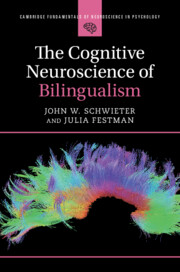Book contents
- The Cognitive Neuroscience of Bilingualism
- Cambridge Fundamentals of Neuroscience in Psychology
- The Cognitive Neuroscience of Bilingualism
- Copyright page
- Contents
- Figures
- Tables
- Acknowledgments
- Chapter One Theories and Methods in the Cognitive Neuroscience of Bilingualism
- Chapter Two Neural Representations and Language Processing in the Bilingual Brain
- Chapter Three Bilingualism, Language Development, and Brain Plasticity
- Chapter Four Aphasia and the Bilingual Brain
- Chapter Five Cross-Linguistic Effects of Bilingualism
- Chapter Six Bilingual Lexical and Conceptual Memory
- Chapter Seven Cognitive and Neurocognitive Effects of Bilingualism
- Chapter Eight Conclusion
- References
- Index
- References
Chapter Eight - Conclusion
Published online by Cambridge University Press: 01 October 2023
- The Cognitive Neuroscience of Bilingualism
- Cambridge Fundamentals of Neuroscience in Psychology
- The Cognitive Neuroscience of Bilingualism
- Copyright page
- Contents
- Figures
- Tables
- Acknowledgments
- Chapter One Theories and Methods in the Cognitive Neuroscience of Bilingualism
- Chapter Two Neural Representations and Language Processing in the Bilingual Brain
- Chapter Three Bilingualism, Language Development, and Brain Plasticity
- Chapter Four Aphasia and the Bilingual Brain
- Chapter Five Cross-Linguistic Effects of Bilingualism
- Chapter Six Bilingual Lexical and Conceptual Memory
- Chapter Seven Cognitive and Neurocognitive Effects of Bilingualism
- Chapter Eight Conclusion
- References
- Index
- References
Summary
In this chapter, we reinforce the book’s aim to shed light on changes inflicted on language, cognition, and the brain rather than to focus on advantages and disadvantages of being bilingual. To obtain a more realistic picture of bilingualism, its assets (i.e., what is easier), and its difficulties (i.e., what is taxing and leads to high consumption of mental resources), we have drawn on research from various disciplines. We conclude the book by identifying complexity as the major issue for research on bilingualism. The complexity problem is fundamental to definitions of bilingualism and the characterization of bilingual participants in empirical studies, leading to discussions about its assessment as a dichotomous or continuous variable. Considering bilingualism as an experience and how such experience impacts overall language development, cognition, and the brain at different levels are related to usage-based approaches of examining bilingualism as well as a concern regarding confounding and moderating variables. The shift for designing research in the field of bilingualism seems to necessarily be more interdisciplinary in nature than in the past.
Keywords
- Type
- Chapter
- Information
- The Cognitive Neuroscience of Bilingualism , pp. 173 - 181Publisher: Cambridge University PressPrint publication year: 2023

